Beijing intends to cooperate with foreign firms in R&D
Updated: 2013-09-08 23:44
By Zhao Lei (China Daily)
|
||||||||
China is promoting cooperation with foreign countries in helicopter research and development, an executive from the national aircraft manufacturer said.
"The government has been negotiating with Russia on cooperating in heavy-lift helicopter development since 2009," said Cai Yi, general manager of Avicopter, a subsidiary of the Aviation Industry Corp of China.
Cai made his remarks during the four-day Second China Helicopter Expo, which concluded in Tianjin on Sunday.
"We are looking forward to deepening cooperation with Russia and other nations that have advanced technologies in the civil helicopter sector," he added.
Though details on the Sino-Russian cooperation have not been finalized, Avicopter designers have begun to create a vision for it.
Huang Chuanyue, deputy chief engineer at Avicopter, is optimistic about such a cooperative venture.
"China and Russia can supplement each other in heavy-lift helicopter technologies. Russia has rich experience in research and development in this field, and China is better when it comes to composite materials and aerodynamics," he said.
Avicopter, the only helicopter manufacturer in China, is also working with Eurocopter, the largest helicopter company in the world in terms of revenue, on the development of the AC352, known as the EC175 by the European company.
The AC352 is the first helicopter cooperative project in which China and a Western nation have shared the same responsibilities and profit, Cai said.
He said comprehensive cooperation between China and other nations can take place because China has made tremendous progress in the helicopter industry.
"Among all kinds of aircraft developed by China, our helicopter series are most capable in the competition of technologies with foreign countries," Cai said. The technology gap between China and those countries in the helicopter sector is narrower than that in other aviation fields, he added.
The AC352 will fill the need for a 6-metric-ton-capacity helicopter market in China and boasts one of the most advanced multipurpose helicopters in the world, said Lu Weijian, Avicopter's chief designer of the aircraft.
He added the project has received purchase intentions for more than 130 AC352s, and the helicopter will conduct its maiden flight in China next year. Once it enters the market, each side will receive 50 percent of income from sales no matter who makes the sales.
"This is a good example of how we can benefit from international cooperation," Lu said.
Regarding engines, China has also made huge strides in international cooperation.
The WZ-16 turboshaft engine, a joint effort of French helicopter engine giant Turbomeca and Aviation Industry Corp of China, will conduct a test by the end of this year.
Philippe Couteaux, Turbomeca's vice-president for airframe, said the successful development of the engine is a "major milestone" for the two countries' cooperation in the helicopter industry.
"In the past, our only advantage when seeking foreign companies or institutes to cooperate with us was our low costs, leaving us at a disadvantage in cooperation," said Wang Ya'nan, deputy editor-in-chief of Aerospace Knowledge magazine.
"Now China has begun to enjoy an equal partnership with foreign helicopter magnates thanks to the rapid development in our technological and manufacturing capabilities."
He said China has created a complete helicopter industry and made remarkable progress in the research of avionics and material sciences.
"However, we still fall behind in some key technologies such as engine techniques. The shortage of well-trained, skilled workers is also a problem."
In some plants, managers have been annoyed by the failure to mass-produce parts as good as those from Western companies even though the Chinese infrastructure and equipment are more advanced and modern than those at foreign companies, he said
"This situation is caused by outdated management methods and an incompetent quality control mechanism, which are fields in which we should learn the most from cooperation with foreign enterprises," he said.
Wang said it is not necessary for civil helicopters to use technologies and parts developed entirely by China.
"Developing our own helicopter industry doesn't necessarily mean we shall get rid of other nations' advanced techniques or equipment. It is unrealistic that we develop a totally new helicopter all by ourselves in a short time."
He suggested China improve its research and development capability in the helicopter industry by launching more cooperative projects with foreign countries and making full use of existing agreements.

 Rodman back from DPRK without jailed American
Rodman back from DPRK without jailed American
 National Games: Pictures of the day
National Games: Pictures of the day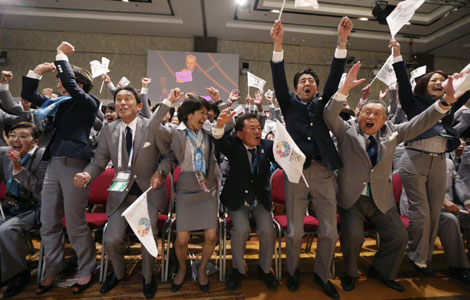
 Abe speech helps secure 2020 Games for Tokyo
Abe speech helps secure 2020 Games for Tokyo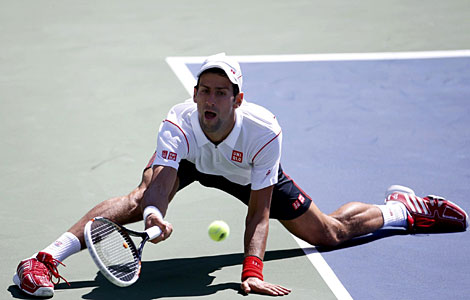
 Djokovic, Nadal set up blockbuster US Open final
Djokovic, Nadal set up blockbuster US Open final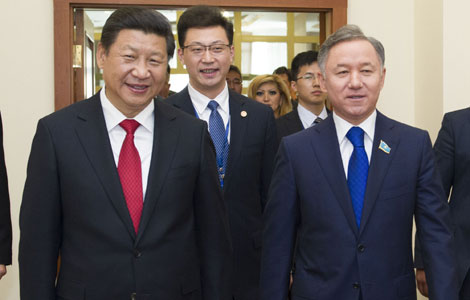
 Xi discusses bilateral ties with Kazakh parliament speaker
Xi discusses bilateral ties with Kazakh parliament speaker
 'Poetic' Italian documentary takes top honor at Venice filmfest
'Poetic' Italian documentary takes top honor at Venice filmfest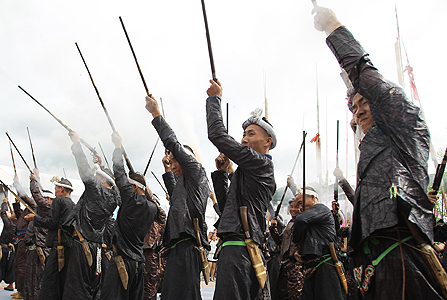
 Welcome with a bang
Welcome with a bang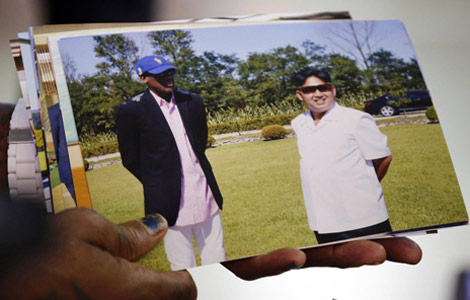
 DPRK top leader meets visiting Rodman
DPRK top leader meets visiting Rodman
Most Viewed
Editor's Picks

|

|

|

|

|

|
Today's Top News
Rodman back from DPRK without jailed American
Co-op with Kazakhstan enjoys broad prospect: Xi
China to improve standards for elderly care
Bizwoman in rail chief case charged with bribery
Chinese scientists publish new findings on H7N9
Xi proposes a 'new Silk Road' with Central Asia
Tokyo wins 2020 Olympics bid
NASA launches explorer to moon
US Weekly

|

|






